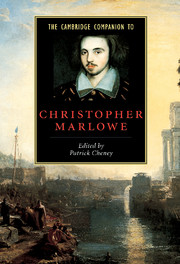Book contents
- Frontmatter
- 1 Introduction: Marlowe in the twenty-first century
- 2 Marlowe’s life
- 3 Marlovian texts and authorship
- 4 Marlowe and style
- 5 Marlowe and the politics of religion
- 6 Marlowe and the English literary scene
- 7 Marlowe’s poems and classicism
- 8 Tamburlaine the Great, Parts One and Two
- 9 The Jew of Malta
- 10 Edward II
- 11 Doctor Faustus
- 12 Dido, Queen of Carthage and The Massacre at Paris
- 13 Tragedy, patronage, and power
- 14 Geography and identity in Marlowe
- 15 Marlowe’s men and women
- 16 Marlowe in theatre and film
- 17 Marlowe’s reception and influence
- Reference Works
- Index
- Series list
- Plate section
10 - Edward II
Published online by Cambridge University Press: 28 May 2006
- Frontmatter
- 1 Introduction: Marlowe in the twenty-first century
- 2 Marlowe’s life
- 3 Marlovian texts and authorship
- 4 Marlowe and style
- 5 Marlowe and the politics of religion
- 6 Marlowe and the English literary scene
- 7 Marlowe’s poems and classicism
- 8 Tamburlaine the Great, Parts One and Two
- 9 The Jew of Malta
- 10 Edward II
- 11 Doctor Faustus
- 12 Dido, Queen of Carthage and The Massacre at Paris
- 13 Tragedy, patronage, and power
- 14 Geography and identity in Marlowe
- 15 Marlowe’s men and women
- 16 Marlowe in theatre and film
- 17 Marlowe’s reception and influence
- Reference Works
- Index
- Series list
- Plate section
Summary
As Marlowe has emerged in recent years as early modern England's most modern playwright, Edward II has emerged as his most modern play, not merely because it treats the life and loves, and stages the brutal debasement, of a recognizably (if not exclusively) homosexual monarch, but also because it presents a decidedly direct and demystified portrayal of power politics at work, showing political positions to be little more than transparent extensions of the personal desires and ambitions that motivate them. The passions on display in Edward II, whether they be Edward's all-consuming love for his favourite, Gaveston, or Mortimer Junior's unrestrained hostility to Edward and Gaveston alike, shape and dominate both the private and political behaviour of the play's two primary antagonists, and contribute mightily to the disordered relations in family and state that obtain throughout the play. As such, they paradoxically present themselves as fit objects of audience censure and disapprobation, and as the primary expressive channels of character formation and audience engagement alike.
Much recent scholarship on the early modern period has been devoted to a reconsideration of the viability of applying traditional theories of the relationship between the four vital bodily elements (blood, yellow bile, phlegm, and black bile) and the four “humours” (sanguine or cheerful, choleric, phlegmatic or stolid, and melancholy) to an understanding of what we late moderns tend to construe as psychological states. An excess of one or other of these elements in an individual’s body (say, of yellow or black bile) was thought to produce a humoural imbalance that would make one’s temperament chronically aggressive, on the one hand, chronically melancholy on the other.
- Type
- Chapter
- Information
- The Cambridge Companion to Christopher Marlowe , pp. 158 - 173Publisher: Cambridge University PressPrint publication year: 2004
- 3
- Cited by



